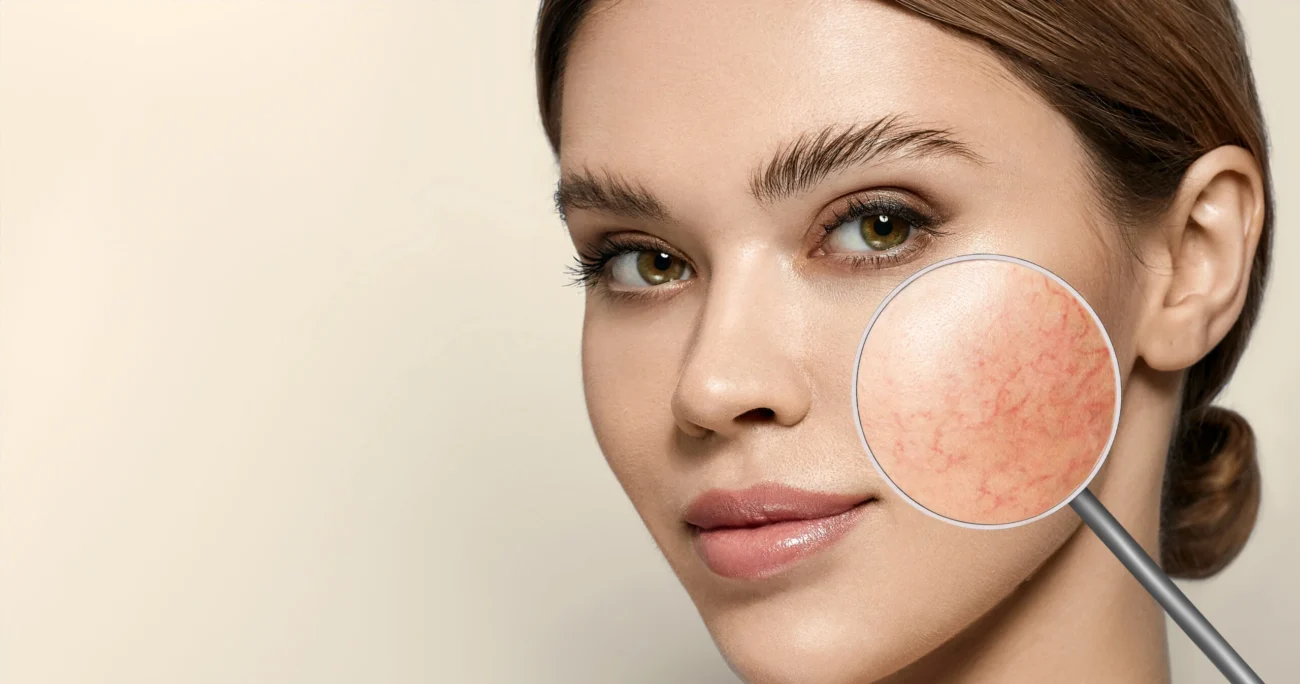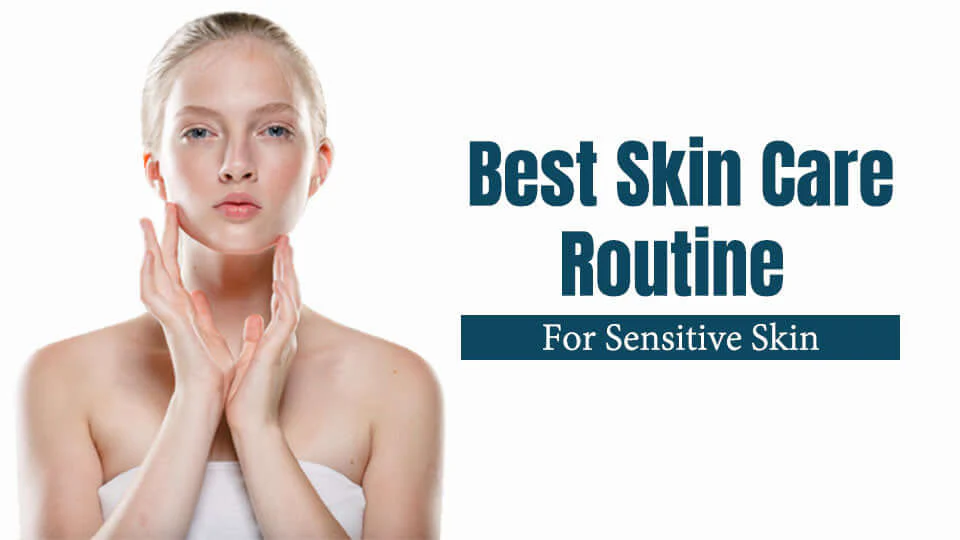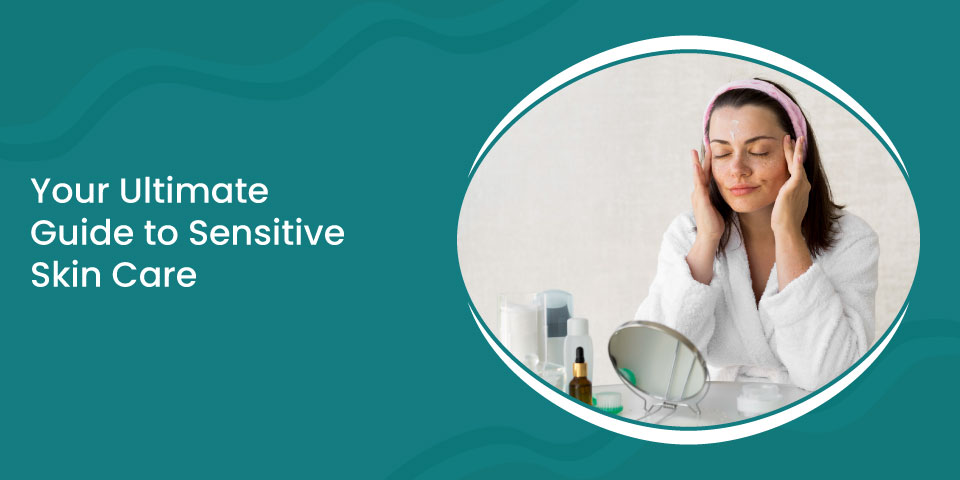
Introduction
Sensitive skin is a common concern that affects millions of people worldwide. Whether due to genetics, environmental factors, or harsh skincare products, sensitive skin requires special attention to avoid irritation, redness, and discomfort. In this comprehensive guide, we’ll explore the causes of sensitive skin, the best skincare routines, ingredient recommendations, and expert tips to keep your skin calm and healthy.
Understanding Sensitive Skin

What Is Sensitive Skin?
Sensitive skin reacts more easily to external irritants, leading to symptoms like:
- Redness
- Itching
- Burning or stinging sensations
- Dryness or flakiness
- Breakouts or rashes
Unlike other skin types, sensitive skin has a weakened skin barrier, making it more prone to irritation from skincare products, weather changes, and pollution.
Causes of Sensitive Skin
Several factors contribute to skin sensitivity:
- Genetics – Some people are born with a predisposition to sensitive skin.
- Environmental Factors – Pollution, UV rays, and extreme weather (hot or cold) can trigger sensitivity.
- Harsh Skincare Products – Alcohol, fragrances, sulfates, and synthetic dyes can irritate the skin.
- Skin Conditions – Eczema, rosacea, and dermatitis often make skin more reactive.
- Diet & Stress – Spicy foods, alcohol, and high stress levels can worsen sensitivity.
Best Skincare Routine for Sensitive Skin

A gentle, consistent skincare routine is essential for managing sensitive skin. Follow these steps to maintain a healthy complexion:
1. Cleansing: The Foundation of Sensitive Skincare
Why it matters: Harsh cleansers strip the skin of natural oils, worsening sensitivity.
What to look for:
- Fragrance-free, sulfate-free cleansers
- Cream or milky textures (avoid foaming cleansers with sulfates)
- pH-balanced formulas (around 5.5)
Recommended Ingredients:
- Ceramides – Strengthen the skin barrier
- Aloe Vera – Soothes irritation
- Oat Extract – Calms redness and itching
Product Recommendations:
- CeraVe Hydrating Cleanser
- La Roche-Posay Toleriane Hydrating Gentle Cleanser
- Vanicream Gentle Facial Cleanser
2. Toning: Hydrate & Restore pH Balance
Why it matters: Alcohol-based toners can be too harsh, but hydrating toners help replenish moisture.
What to look for:
- Alcohol-free formulas
- Hydrating ingredients like hyaluronic acid and glycerin
Recommended Ingredients:
- Hyaluronic Acid – Deep hydration without irritation
- Chamomile Extract – Reduces redness
- Green Tea Extract – Antioxidant protection
Product Recommendations:
- Klairs Supple Preparation Unscented Toner
- Paula’s Choice Enriched Calming Toner
- Avene Thermal Spring Water
3. Serums: Targeted Treatment for Sensitivity
Why it matters: Serums deliver concentrated ingredients to soothe and repair the skin barrier.
What to look for:
- Anti-inflammatory ingredients
- No essential oils or synthetic fragrances
Recommended Ingredients:
- Niacinamide (Vitamin B3) – Reduces redness and strengthens the skin barrier
- Centella Asiatica (Cica) – Heals irritated skin
- Panthenol (Vitamin B5) – Soothes and hydrates
Product Recommendations:
- The Ordinary Niacinamide 10% + Zinc 1%
- Dr. Jart+ Cicapair Tiger Grass Serum
- SkinCeuticals Hydrating B5 Gel
4. Moisturizing: Lock in Hydration
Why it matters: A damaged skin barrier loses moisture quickly, leading to dryness and irritation.
What to look for:
- Rich, non-comedogenic creams
- Ceramides and fatty acids to repair the skin barrier
Recommended Ingredients:
- Shea Butter – Deeply nourishes
- Squalane – Lightweight hydration
- Allantoin – Soothes irritation
Product Recommendations:
- First Aid Beauty Ultra Repair Cream
- CeraVe Moisturizing Cream
- Eucerin Advanced Repair Cream
5. Sun Protection: Essential for Sensitive Skin
Why it matters: UV exposure worsens redness and irritation.
What to look for:
- Mineral (physical) sunscreens with zinc oxide or titanium dioxide
- Fragrance-free and non-comedogenic
Recommended Products:
- EltaMD UV Clear Broad-Spectrum SPF 46
- La Roche-Posay Anthelios Mineral SPF 50
- Aveeno Protect + Hydrate SPF 60
Ingredients to Avoid for Sensitive Skin

Some ingredients can trigger irritation and should be avoided:
❌ Alcohol (Denatured, SD Alcohol, Isopropyl Alcohol) – Dries out skin
❌ Fragrances (Synthetic & Essential Oils) – Can cause allergic reactions
❌ Sulfates (SLS, SLES) – Harsh cleansers that strip natural oils
❌ Exfoliating Acids (Glycolic, Lactic Acid in high concentrations) – Can cause redness
❌ Retinoids (Unless Formulated for Sensitive Skin) – May cause peeling and irritation
Lifestyle Tips for Managing Sensitive Skin
Beyond skincare, lifestyle choices impact skin sensitivity:
✔ Use Lukewarm Water – Hot water strips natural oils.
✔ Avoid Over-Exfoliating – Limit exfoliation to once a week with gentle enzymes (not scrubs).
✔ Patch Test New Products – Apply a small amount behind the ear before full-face use.
✔ Choose Hypoallergenic Makeup – Look for non-comedogenic, fragrance-free options.
✔ Manage Stress – High cortisol levels can trigger flare-ups.
When to See a Dermatologist
If your sensitive skin doesn’t improve with gentle skincare, consult a dermatologist. You may have an underlying condition like:
- Rosacea – Chronic redness and visible blood vessels
- Eczema (Atopic Dermatitis) – Dry, itchy patches
- Contact Dermatitis – Allergic reaction to skincare ingredients
A dermatologist can prescribe medicated creams or recommend clinical treatments like laser therapy.
Final Thoughts
Sensitive skin requires a gentle, consistent approach to maintain a healthy complexion. By choosing fragrance-free, soothing ingredients and avoiding harsh irritants, you can reduce redness, dryness, and discomfort. Always patch-test new products and consult a dermatologist if irritation persists.
Key Takeaways:
✅ Use fragrance-free, alcohol-free skincare
✅ Focus on barrier-repairing ingredients like ceramides and niacinamide
✅ Always wear sunscreen to prevent UV-induced irritation
✅ Avoid over-exfoliation and harsh scrubs
By following these guidelines, you can achieve calm, glowing skin—even with sensitivity!

